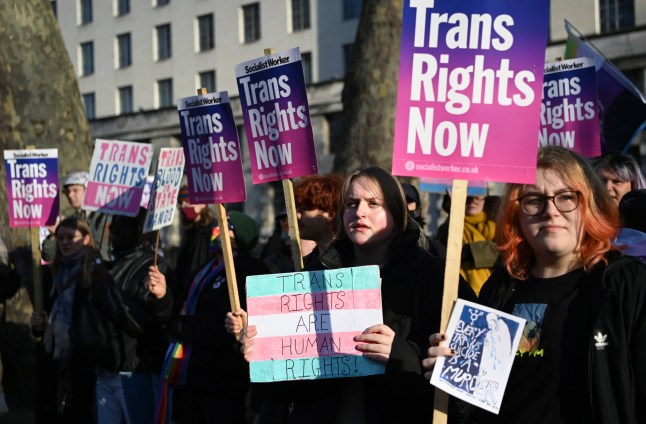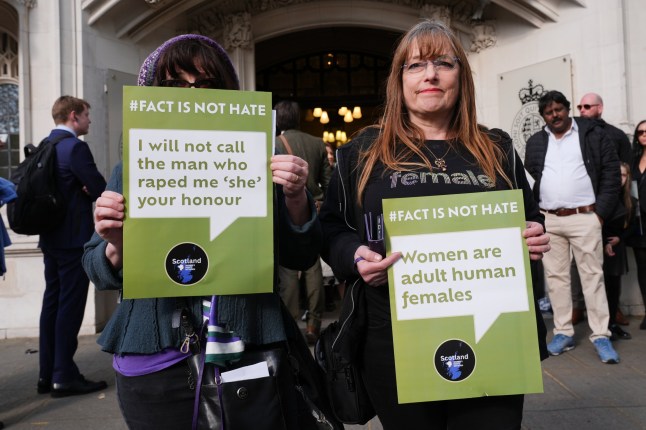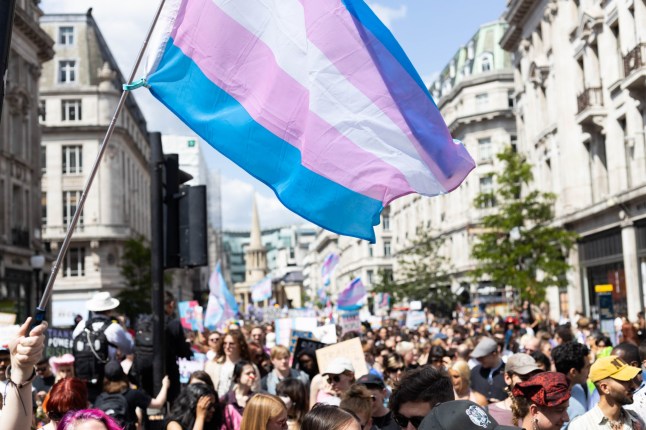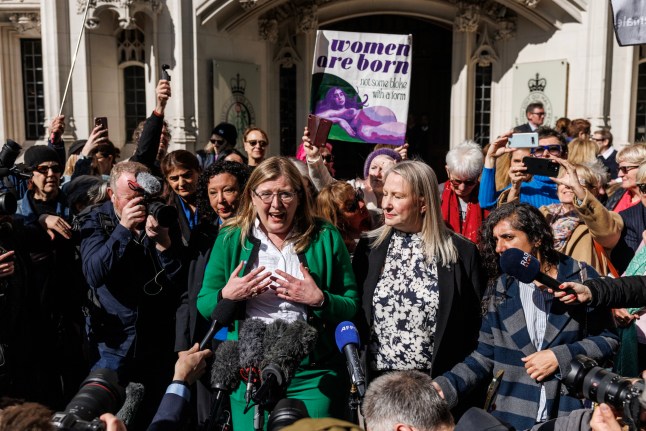To view this video please enable JavaScript, and consider upgrading to a web
browser that
supports HTML5
video
JK Rowling has spoken out about a landmark ruling by the Supreme Court, stating it has ‘protected the rights of women and girls across the UK.’
The author, who is also known for her controversial campaigning for women’s rights, said she was ‘so proud’ to know the women who launched a series of legal challenges over what the definition of a woman is.
During a ruling this morning, the UK Supreme Court ruled unanimously infavour of the legal challenge brought by For Women Scotland (FWS), stating the definitions of ‘sex’ and ‘woman’ in Equality Act 2010 refer to ‘biological sex’.
But they added that trans people are still protected from discrimination under the same law.
The ruling by the UK’s highest court means that trans women with gender certificates can be barred from single-sex areas.

What is your opinion on the UK Supreme Court ruling regarding the definition of a ‘woman’?
- I agree with the ruling
- I disagree with the ruling
- I need more information to form an opinion
- I don’t have an opinion on this matter
In a post on X, JK wrote: ‘It took three extraordinary, tenacious Scottish women with an army behind them to get this case heard by the Supreme Court and, in winning, they’ve protected the rights of women and girls across the UK. @ForWomenScot, I’m so proud to know you.’
Five judges were tasked with deciding whether the legal understanding of ‘woman’ includes trans women with gender recognition certificates (GRC).
Join Metro’s LGBTQ+ community on WhatsApp
With thousands of members from all over the world, our vibrant LGBTQ+ WhatsApp channel is a hub for all the latest news and important issues that face the LGBTQ+ community.
Simply click on this link, select ‘Join Chat’ and you’re in! Don’t forget to turn on notifications!
The Scottish Government said this definition includes trans women with a GRC, a document that shows a person’s affirmed gender is legally recognised.
While For Women Scotland (FWS), which campaigns against trans rights, said this should only be for ‘biological women’.
While presenting the Supreme Court’s decision this morning, Lord Hodge said: ‘The terms “woman” and “sex”, in the Equality Act 2010, refer to a biological woman and biological sex.
‘But we counsel against reading this judgement as a triumph of one or more groups in our society at the expense of another, it is not.’
He added: ‘The Equality Act 2010 gives transgender people protection, not only against discrimination through the protected characteristic of gender reassignment, but also against direct discrimination, indirect discrimination and harassment in substance in their acquired gender.’
The ruling adds that a trans woman can claim sex discrimination because they are perceived to be a woman.

What did the judges rule on?
The ruling related to two different aspects of how people think of gender.
Sex – something assigned at birth based on external anatomy – and gender identity, the internal, deeply held sense of one’s gender.
If someone’s sex assigned at birth aligns with their gender identity, that person is cisgender or ‘cis’.
Both are covered by the Equality Act 2010, the bedrock of equalities law that covers Britain. The act protects characteristics including sex, gender and gender reassignment against discrimination.

Trans people are protected from discrimination regardless of whether they have a GRC. By ‘gender reassignment’, the act means someone who has proposed to undergo, is undergoing or has undergone trans healthcare.
The act defines a woman as a ‘female of any age’. But the judges are deciding exactly what the act means by ‘sex’ as a protected characteristic.
What is a gender recognition certificate (GRC)?
With a GRC, a trans adult can update their birth certificate, marriage certificate and HMRC records to reflect their identity as well as their death certificate.
The paperwork is not needed for trans people to change their legal names or update the sex marker on IDs like passports or driving licences.
In 2018, only about 1% of trans people had a GRC, according to official figures. There are 262,000 openly trans people in England and Wales – or 0.5% of the population.
The gender recognition system requires trans people to receive a diagnosis of gender dysphoria, which can take years due to the years-long waiting times at NHS gender clinics.
Non-binary people are not legally recognised in the UK.
FWS took legal action after the Scottish Parliament passed a bill to ensure gender balance on public sector boards in 2018.
The case is a response to a 2022 ruling that said sex is ‘not limited’ to biological sex and the ability of a GRC to change a person’s legal sex ‘does not offend against, or give rise to any conflict with, legislation where it is clear that ‘sex’ means biological sex’.
FWS say that trans women should not be allowed to access most single-sex spaces and services that match their identity – think public toilets, changing rooms or domestic abuse refuges.

Trans women can legally use these services without a GRC. They can only be excluded from single-sex spaces to achieve a ‘legitimate aim’.
The ruling brings ‘clarity and confidence, for women and service providers such as hospitals, refuges, and sports clubs’, a Government spokesperson said.
First Minister John Swinney said the Scottish Government ‘accepts today’s Supreme Court judgment’.
Following the decision, a UK Government spokesman said: ‘We have always supported the protection of single-sex spaces based on biological sex.
‘This ruling brings clarity and confidence, for women and service providers such as hospitals, refuges, and sports clubs.
‘Single-sex spaces are protected in law and will always be protected by this Government.’
Lord Hodge said that including people with a GRC under the ‘sex’ protected characteristic makes the Equality Act read in an ‘incoherent way’.
‘Gender reassignment and sex are separate bases for discrimination and inequality,’ the ruling says.

The keyword here is ‘separate’ said Sophie Molly, a Scottish trans rights campaigner.
‘Trans rights are being stripped away under the pretence of defending women’s rights. Trans women are women. There should be no separate law for cis and trans women,’ she told Metro.
‘To have such a thing take effect is extreme discrimination… We will overcome. We will never give in.’
The Good Law Project, a governance watchdog, agreed. ‘The Supreme Court sided with FWS. But it didn’t hear from a single trans person,’ the firm wrote on Bluesky.
‘This ruling sets a dangerous precedent and erases trans women from protections. It puts trans rights back 20 years.’
Scottish Greens MSP Maggie Chapman added: ‘This is a deeply concerning ruling for human rights and a huge blow to some of the most marginalised people in our society.

‘It could remove important protections and will leave many trans people and their loved ones deeply anxious and worried about how their lives will be affected and about what will come next.
‘Trans people just want to be able to live their lives like any of us, without the fear of prejudice or violence, but today they have been badly let down.’
Simon Blake, the CEO of Stonewall, added: ‘It’s important to be reminded the court strongly and clearly reaffirmed the Equality Act protects all trans people against discrimination, based on gender reassignment, and will continue to do so.’
In response to the ruling, FWS said on X:’ Yaaaaaaaaaaaaaaaaaaaaaaaaaaaaas #WeKnowWhatAWomanIs.’
For now, Sophie knows how she will live her life.
‘I will continue to use female spaces,’ she added, ‘I am a woman and it is my right!’
Get in touch with our news team by emailing us at webnews@metro.co.uk.
For more stories like this, check our news page.


